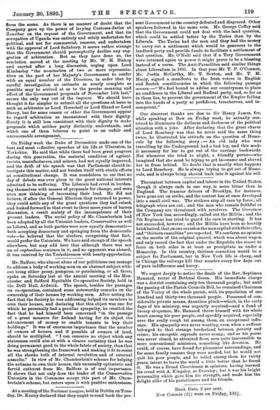On Friday week the Duke of Devonshire made one of
the best and most reflective speeches of his life at Ulverston, in Yorkshire. He said that while there had been great progress during this generation, the material condition of agricul- turists, manufacturers, and miners, had not equally improved, and the drift of his speech was that Parliament should in- vestigate this matter, and not burden itself with sterile efforts at constitutional change. It was scandalous to see that no day of debate was ever given to the great national interests admitted to be suffering. The Liberals had erred in burden- ing themselves with masses of proposals for change, and were even now thinking of increasing their load. He did not believe, if after the General Election they returned to power, they could settle any of the great questions they had raised, and looked forward in that event to three more years of barren discussion, a result mainly of the incompetence of their present leaders. The social policy of Mr. Chamberlain had been adopted by all the Unionist leaders, Conservative as well as Liberal, and as both parties were now equally democratic— both accepting democracy and springing from the democratic vote—he believed that the electors, recognising that fact, would prefer the Unionists. We have said enough of the speech elsewhere, but may add here that although there was not an ad eaptandum sentence in it, and no opponent was abused, it was received by the Yorkshiremen with hearty approbation.


















































 Previous page
Previous page